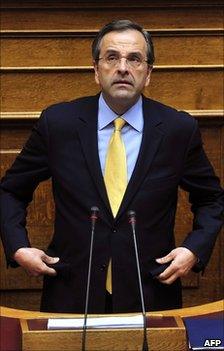Cornering Greece in Brussels
- Published
- comments

Greek opposition leader Antonis Samaras is under pressure to back the cuts
There is an air of desperation in Brussels. For a year they have thrown everything at resolving Europe's debt crisis but still it persists. They have re-written their own rule book, committed hundreds of billions in loans, given birth to new mechanisms. And yet it has not gone away.
So again, at this summit, there is the commitment to do "whatever is necessary" to ensure the financial stability of the eurozone.
Greece stubbornly stands in the way. Next Tuesday, the Greek parliament must vote on a raft of austerity measures. If the MPs were to reject the new round of cuts, we would have reached a defining moment for the single currency.
The EU insists that backing the austerity plan is a condition for fresh loans and without a new tranche of money Greece would be heading for a default. Yesterday the head of the Eurogroup, Jean-Claude Juncker, insisted there was "no plan B".
Yet many believe this is a game of bluff. The fear of Greece defaulting - and the consequent risk of a European banking crisis - is so embedded in EU thinking that many officials believe that funds would still be made available to Athens in the event of a "no" vote.
Cornered by Merkel
One condition for further emergency loans was that Greece reached a consensus supporting a new five-year austerity plan. European leaders want the government, the opposition and - if possible - the public to reach national unity behind the rescue package. That remains elusive.
The Greek opposition leader, Antonis Samaras, says cuts are not working, that they are slowly strangling the country.
Yesterday saw an unprecedented intervention by the EU into Greek domestic politics. Mr Samaras, who was in Brussels, was put under ferocious pressure to change his views. He was a man rounded on.
Angela Merkel, the German chancellor, told him to do what was necessary to get behind the austerity package. She spoke of the Greek opposition needing to "fulfil its historic responsibilities". One observer of the European scene said he had never seen anything like it before and it smacked of desperation.
In Greece itself the government is so anxious about the outcome of the vote that it tried to soften some of the measures. But it opened up a 3bn euro black hole in the calculations which, after discussion with EU and IMF officials in Greece, was closed.
There is now agreement between the Greek government and the EU and the IMF on the terms of the five-year austerity package. Beyond the short term, Europe's leaders have begun discussing a second Greek bail-out of around 100bn euros.
But will the strategy work?
Default looms

Greek police trade unionists are among those protesting against the cuts
It hasn't so far. The first year of austerity led to the loss of 400,000 jobs and industrial production slumping by 11%. There have been flickers of good news with tourism robust and exports growing, but many ordinary Greeks have seen their incomes slump.
The EU Commission has recognised this and has begun exploring ways to insist on austerity while trying to stimulate growth. The President of the Commission, Jose Manual Barroso, said: "Fiscal consolidation is indispensable.
"Structural reforms are indispensable. The privatisation programme as well. But we have to make it clear that this is a contribution for growth. And I have presented this initiative after consultations with Prime Minister Papandreou to look at how we can use the existing European funds, structural funds, in Greece, so they maximise their immediate impact on growth and jobs."
Greece, it turns out, has only used a quarter of its EU funds for 2007-2013. It means there are 15bn euros left to spend. The reason for this is that Greece has struggled to come up with the co-financing to draw down the funds.
So President Barroso is working on an idea to provide "technical assistance" to Greece. This would act as a kind of co-financing, so opening up access to the money.
As often with the EU, the details are frequently opaque and many questions questions remain unanswered. Who would be in charge of these funds? Would it be the government or would Greece not be trusted? Would they kick-start growth or disappear into bureaucracies? .
It could be an ingenious way of helping Greece escape its cycle of decline, or of throwing more money at a country that needs to default and start again.
As it stands, most economists and the markets believe Greece will default - the only question is when. Even some people close to George Papandreou believe default is better than years of austerity.
And to end on a different note. Yes, Britain will not have to contribute to a new Greek bail-out under what is called the EFSM but, of course, the UK contributes to the IMF and the fund will be heavily committed to the Greek bail-out Mark II.